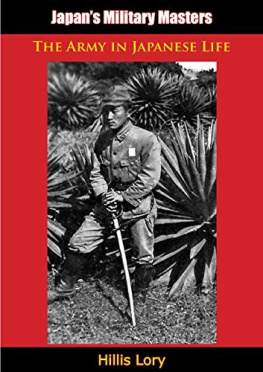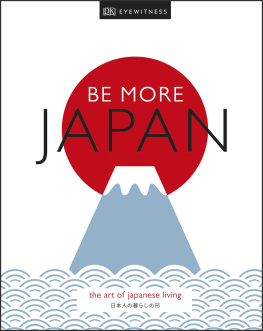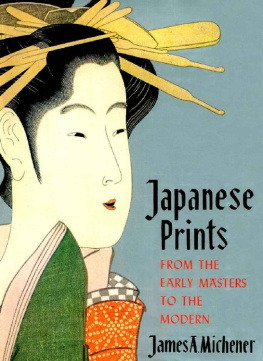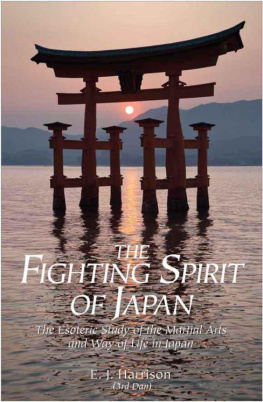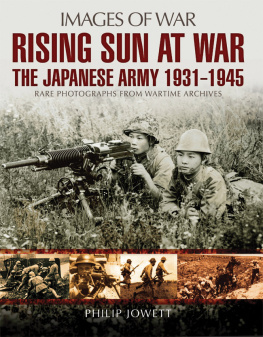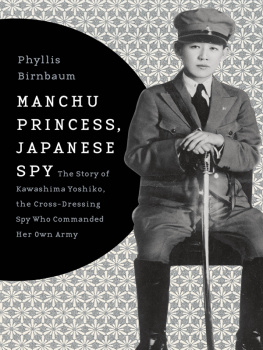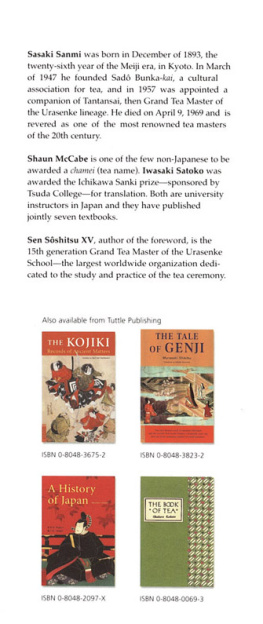Hillis Lory - Japan’s Military Masters: The Army in Japanese Life
Here you can read online Hillis Lory - Japan’s Military Masters: The Army in Japanese Life full text of the book (entire story) in english for free. Download pdf and epub, get meaning, cover and reviews about this ebook. year: 2018, publisher: Eschenburg Press, genre: Romance novel. Description of the work, (preface) as well as reviews are available. Best literature library LitArk.com created for fans of good reading and offers a wide selection of genres:
Romance novel
Science fiction
Adventure
Detective
Science
History
Home and family
Prose
Art
Politics
Computer
Non-fiction
Religion
Business
Children
Humor
Choose a favorite category and find really read worthwhile books. Enjoy immersion in the world of imagination, feel the emotions of the characters or learn something new for yourself, make an fascinating discovery.
- Book:Japan’s Military Masters: The Army in Japanese Life
- Author:
- Publisher:Eschenburg Press
- Genre:
- Year:2018
- Rating:3 / 5
- Favourites:Add to favourites
- Your mark:
- 60
- 1
- 2
- 3
- 4
- 5
Japan’s Military Masters: The Army in Japanese Life: summary, description and annotation
We offer to read an annotation, description, summary or preface (depends on what the author of the book "Japan’s Military Masters: The Army in Japanese Life" wrote himself). If you haven't found the necessary information about the book — write in the comments, we will try to find it.
Hillis Lory: author's other books
Who wrote Japan’s Military Masters: The Army in Japanese Life? Find out the surname, the name of the author of the book and a list of all author's works by series.
Japan’s Military Masters: The Army in Japanese Life — read online for free the complete book (whole text) full work
Below is the text of the book, divided by pages. System saving the place of the last page read, allows you to conveniently read the book "Japan’s Military Masters: The Army in Japanese Life" online for free, without having to search again every time where you left off. Put a bookmark, and you can go to the page where you finished reading at any time.
Font size:
Interval:
Bookmark:

This edition is published by ESCHENBURG PRESS www.pp-publishing.com
To join our mailing list for new titles or for issues with our books eschenburgpress@gmail.com
Or on Facebook
Text originally published in 1943 under the same title.
Eschenburg Press 2018, all rights reserved. No part of this publication may be reproduced, stored in a retrieval system or transmitted by any means, electrical, mechanical or otherwise without the written permission of the copyright holder.
Publishers Note
Although in most cases we have retained the Authors original spelling and grammar to authentically reproduce the work of the Author and the original intent of such material, some additional notes and clarifications have been added for the modern readers benefit.
We have also made every effort to include all maps and illustrations of the original edition the limitations of formatting do not allow of including larger maps, we will upload as many of these maps as possible.
DEDICATION
DEDICATED TO
TWO DISTRACTING LITTLE DAUGHTERS,
PRISCILLA, FOUR YEARS OLD, AND NANCY, AGE TWO,
WHO WERE NO HELP IN WRITING THIS BOOK
FOREWORD
In Japan the present war with the United Nations is called a Holy War. It assumes all the emotional drive of a religious crusade. We Westerners are foolish if we dismiss this evidence of their thinking as a kind of exaggerated wordiness. It is more than that. It reflects a national conviction so important it gives to Japan and her fighting men a strength beyond matriel...
Two years before Pearl Harbor, the Army warned the people that suffering and privation lay ahead, promising however, that after a decade Japan would be the strongest nation in the world. The Japanese have always been strong in adversity. Today they are prepared to accept everything except defeat. We can expect Japan to fight virtually until the last soldier is killed and her last ship is sunk
These random excerpts from the following pages of Japans Military Masters convey in ringing words the basic theme and purpose of this timely and admirably written book. In its pages will be found a vivid explanation of many things about the strength and spirit of Japans military machine and Japans fighting capacity which are still only dimly perceived by most Americans today. A primary axiom in war is to know your enemy. Mr. Lory, by long and intimate personal experience, knows that military caste and machine as few of us do. He tells his story succinctly and cogently, illustrating his presentation with firsthand accounts of conversations with Japanese military leaders and of dramatic events which he himself witnessed.
We Americans will do well to profit by knowledge of the facts set forth in this book. Victory in battle, said a Japanese officer to the author, is made up of more things than is dreamed of by the common man. Not the least of these is the morale of the whole nation and the support it gives the Army. The support we give our own Army, our Navy, and all of our fighting forces may well determine for us the difference between victory and defeat. We cannot afford to allow to our enemy a monopoly on spiritual mobilization. I believe that, as yet, we have only scratched the surface of the self-denials in our daily lives that we shall be called upon to make before we shall have wholly destroyed that fanatical Japanese military machine, discredited it in the eyes of its own people, and rendered it incapable of reproducing itself in future. This book presents sound and unanswerable reasons for the necessity of an all-out effort in fighting this war, not only by our forces but by each and all of us on the home front.
JOSEPH C. GREW
PREFACE
My interest in the Japanese Army dates from 1926 when I first went to Japan as a member of the faculty of the Hokkaido Imperial University, located at Sapporo on the northern island of Hokkaido.
Hokkaido was a pioneer area. Sapporo was a hinterland city. The people were purely Japanese in thought. They were little influenced by the impact of Western civilization which daily hit such cities as Tokyo, Yokohama, and Kobe.
From the window of my upstairs study I could look over the fence that separated our garden from an Army drill ground. The guttural commands of Japanese officers and the rhythmic beat of marching feet remain vivid memories.
My closest Japanese friend of those years was a major who on long hiking and fishing trips gave me a wealth of information on Army life and the psychology of the Japanese soldier.
A deepening conviction that to know Japan one must know the Army urged me to accumulate other material on the Military. On each succeeding trip to Japan I have added to this. In the course of time I came to know a number of officers, including two Ministers of War, General Sadao Araki and General Senjuro Hayashi, later Premier.
Their co-operation gave me a strategic advantage which encouraged me to ask directly of Japans War Ministry for more information. I knew the Army was proud of its seishin kyoiku the spiritual training of the soldier, and so I was able to get my foot in the door of the War Ministry by asking for information on this subject. They readily gave me material in this field. This opened the door for securing other information of a much wider scope on the Japanese Army.
With minor exceptions, the data on the conscription system, the building of the seishin kyoiku within the Army, the training of the soldier and the officer, and the study of Army organization was secured officially from the Japanese Ministry of War. This has been checked in as far as possible by personal observation and with the opinions of foreign military observers.
Obviously, no information on Army factions was made available through the Ministry of War. On the broad questions of propaganda, the Militarys basic domestic and foreign policies, the information obtained from military authorities was incomplete. This was supplemented by material gathered from other sourcesfrom Japanese officers speaking in a private capacity, from Army publications, government officials, representatives of former political parties, and a generous sampling of public opinion.
When I was in Japan in 1937 I secured information for the last time directly from the Ministry of War in Tokyo, as the outbreak of the Sino-Japanese War in July of that year imposed a stricter censorship on military affairs. I continued, however, to gather material from other Japanese sources.
I received more immunity from police interference than I had hoped. A morning spent in the police station at Hsinking, in Manchoukuo, after taking pictures of Japanese soldiers, was my only casualty.
I want to thank Mr. Joseph C. Grew for his Foreword and Mr. Chester R. Heck for his deep interest and encouragement. My wife Sarah, who was my constant companion in those years in Japan, has helped so much in every phase of the preparation of this manuscript, it is in fact hers as well as mine.
This book makes no pretence of giving a sensational revelation of Japans militarists. My purpose is to present a calm and deliberate analysis of Japans Army and its multiple role within the nation with the hope that it will contribute to that prerequisite to victoryknow your enemy.
HILLIS LORY
Palo Alto, California
March 13, 1943
1 Japans Army of the People
WITHIN Japan the Army is immeasurably more than a military machine. It holds unrivalled power within the government, ruthlessly cutting the pattern of Japans foreign and domestic policies to meet its own specifications. It sets the tone as well as reflects the thinking and aspirations of the Japanese people. For Japan as for no other country, to know her Army is to know the nation.
Font size:
Interval:
Bookmark:
Similar books «Japan’s Military Masters: The Army in Japanese Life»
Look at similar books to Japan’s Military Masters: The Army in Japanese Life. We have selected literature similar in name and meaning in the hope of providing readers with more options to find new, interesting, not yet read works.
Discussion, reviews of the book Japan’s Military Masters: The Army in Japanese Life and just readers' own opinions. Leave your comments, write what you think about the work, its meaning or the main characters. Specify what exactly you liked and what you didn't like, and why you think so.

